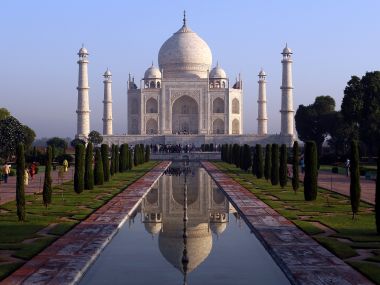The Supreme Court, on Tuesday, directed the Uttar Pradesh Sunni Wakf Board to produce documents bearing the signature of Mughal emperor Shah Jahan to prove its claim of ownership over the Taj Mahal. According to a report in the
Hindustan Times, the court granted the board a week’s time to submit the documents. The
Archaeological Survey of India (ASI) had petitioned the court in 2010 against the Wakf board’s July 2005 decision ordering that the Taj be registered as the latter’s property. There is a stay on the order. [caption id=“attachment_4105387” align=“alignleft” width=“380”] File image of Taj Mahal. Getty Images[/caption] While hearing the petition filed by the ASI in 2010,
a bench led by Chief Justice of India Dipak Misra, told the board, “Who in India will believe it belongs to the wakf board? These kind of issues must not waste the time of the Supreme Court.” “When was it given to you? When did you come in? For over 250 years, the East India Company was in possession. After that it passed to the Central government. The ASI (Archaeological Survey of India) has been in charge of managing it. It had the right of administration,”
the chief justice added, while tracing the history of the monument. When senior advocate VV Giri, who is representing the Wakf board, told the apex court that Shah Jahan had executed a wakfnama in favour of the board, the bench demanded that the board place the “original deed executed by Shah Jahan” before the court. The chief justice also questioned the board on how Shah Jahan had signed the wakfnama. “How did he (Shah Jahan) sign the wakfnama? He was in jail and used to view the monument while in custody,” Misra asked, according to the Hindustan Times. ADN Rao, the ASI’s advocate, told the Supreme Court that there was no such wakfnama. “Under the 1858 proclamation, the properties taken from the last Mughal emperor, Bahadur Shah Zafar, were vested with the Queen,” Rao said,
according to reports. “By a 1948 Act, the buildings were taken over by the Indian government,” he added. The matter reached the Supreme Court after a resident of Uttar Pradesh moved the
Allahabad High Court seeking to be appointed as caretaker of the Taj Mahal, as a Mughal descendant. The high court had refused to intervene and asked him to make a representation to the Wakf board.
The Supreme Court, on Tuesday, directed the Uttar Pradesh Sunni Wakf Board to produce documents bearing the signature of Mughal emperor Shah Jahan to prove its claim of ownership over the Taj Mahal.
Advertisement
End of Article


)

)
)
)
)
)
)
)
)



